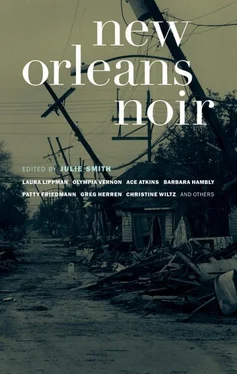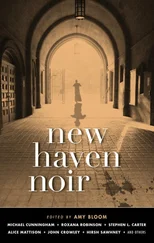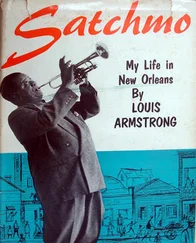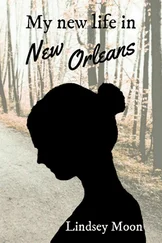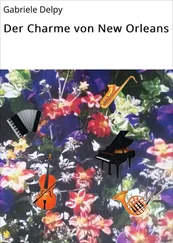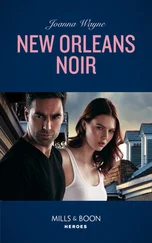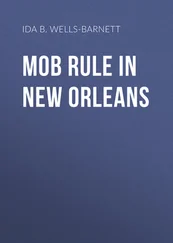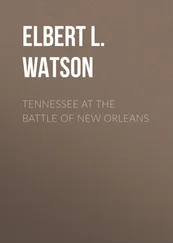“Demons.”
“What was it?”
“Horses.”
“You religious?” Jack asked.
The pretty Indiana girl stubbed out her cigarette on one of the statue’s base stones and tucked back on her uniform hat. “Not at all.”
At midnight there was a riot. A man who’d shot at the police from the top of the hot sauce factory in Mid-City had decided to lock himself in the portable toilet.
A few minutes before, he’d stuck his penis through one of the holes and told a female guard to “suck it” as he masturbated with his eyes rolling up in his head. Instead, she’d whacked it hard with a billy club and then two of the other inmates in an adjoining cell had started climbing the chain link and screaming at the guards.
The guards were able to mace the two on the walls but the man who’d started it all had run and shut himself in the toilet.
Jack said: “Give me the hose.”
Guards pulled the hose from the edge of the train platform and ran the nozzle to Jack.
“Turn it up.” And he unlocked the gate and walked inside and thumbed open the toilet’s door.
The flush of water blew the man against the back wall of the toilet and washed him outside in a long brown stream until he rolled and crawled to the far corner of the cell.
“Goddamn!” the man yelled, curling into a ball. Both hands on his privates, his brown pants at his knees.
“Turn it down,” Jack said.
You wrote a report, fingerprinted them, and then tagged them. Pink for federal cases, green for misdemeanors, and red, yellow, and blue for different kinds of felonies. They were locked up, given something to eat, and then shipped on buses by gun bulls out of the Louisiana State Penitentiary in Angola the next morning.
“Move ’em in, herd ’em out,” Jack always said.
A few days before, a two-time loser had driven a stolen car to the drop-off zone at the old Amtrak station, walked up to the front desk, and asked the warden for a one-way train ticket.
The warden, ten years on the job running Angola, asked for his driver’s license and registration, and it wasn’t but a second later that he nodded to Jack and another guard. “Yes sir. Yes sir. One-way ticket to Angola coming up.”
They took him to the platform and locked him in with a French Quarter street musician who’d been caught stuffing his pockets with cold medicine and NoDoz at what was left of the Walgreens on Canal.
The next day, transport carriers and Humvees passed by the Convention Center carrying soldiers with farm-boy grins and buzz cuts. They waved and smiled in a slow, steady parade, most of them carrying cameras and camcorders aimed at all the wreckage.
Jack watched another Humvee roll by the La Louisiane Ballroom — two skinny, goofy kids giving a thumbs-up — where the Guard held two prisoners. The officers came from Arkansas and rolled their own cigarettes and wore sunglasses like Jack.
“Y’all got to clean this up?” Jack asked.
“Good God Almighty, I hope to hell not.”
Jack eyed the mess and walked under the shaded outdoor roof. There were: folding chairs and MRE packs, spoiling milk and open Heineken bottles, inflatable mattresses, CDs, overnight cases, water jugs and suitcases, rotting food and bottles of urine and piles upon piles of garbage, a faded World War II veteran’s hat, baby blankets and some kid’s New York Giants helmet, jumper cables, unopened bottles of Corona, and hotel beach chairs.
A chopper’s propellers beat overhead and along the Mississippi.
Jack picked up the vet’s hat, studied the gold pins, and placed it back, softly, on the chair.
In an old pile of dog food sat an empty bottle of champagne. Veuve Clicquot Ponsardin. Forty-five-dollar label.
There were millions of flies and the foul smell of rotting food and human waste. Jack reached into his pocket for a bandana and covered his mouth. He felt lunch back up in his throat.
From the other side of the building, one of the Army men yelled: “It’s a grand ol’ ballroom, ain’t it?”
There was better cell phone coverage up on the overpass, and even though I-10 didn’t go anywhere, Jack would drive his truck up there, heading north toward the airport until the water started coming up at the Metairie Cemetery. And he’d sit there and call his dad and talk about busted boats and files lost at sea and insurance folks who wouldn’t respond to messages. Mostly he’d eat MREs with the sun going down, occasionally giving directions to rescue workers from other states who didn’t know the damn interstate was closed.
It was a week or so after the storm when he felt that bullet zip by his ear and heard the sharp report of a pistol.
He rolled off the hood and found his footing.
Reaching into the passenger seat, he pulled out a rifle and duck-walked back behind the concrete barrier. He didn’t have field glasses or a scope but could pick out the rough-shadowed shape in the sun setting through the endless marble mausoleums.
Another shot pinged off the concrete.
With breath held, he took aim and shot.
He heard a scream.
Jack jumped over the barricade and moved across the interstate and into the waist-deep water, rifle in the crook of his arm, his eyes following the shadowed shape through the rows of crypts and canals of golden water under oaks.
The water grew up to his chest and he waded into the city, breathing hard, and stopped to listen, slowing down his heart and lungs, hearing that splashing frantic sound in the distance, and then he turned and took in another row of mausoleums, another grand monument to wealth, another angel, another sphinx, another proud man in marble staring down with sad dead eyes.
He lost the sound.
He heard birds and a siren, and standing there he knew he was lost. He could not see the road or even find it. He only saw the sun, the giant glowing orb of light painting everything orange and gold and making all the dead things shine so soft.
Jack spat some tobacco juice into the stale water and walked, wiping his mustache with the back of his hand, following the rows. Past a giant monument to the lost Confederate dead and then past a small statue of a fat man holding a quill pen.
The light was dull orange now. The bearded trees giving long shadows.
The sound of birds.
And then a sucking sound of rotten, slow breath.
He turned blind down a waist-deep path. In the shadows, only the thinnest sliver of gold light ran down the middle of the still brown water, almost an arrow.
At the top step of a marble crypt sat a young boy, maybe ten, holding his swollen belly, covered in blood. He breathed thick and hard and wet and he watched Jack come down the waterway and soon emerge on a bottom step, and then another, until the man grew tall and towered above him.
Jack placed his rifle on the last step. His clothes dripping.
The boy pushed himself against the locked glass doors to the long-dead family, each of their names and dates of life written in gold on marble.
Jack took off his shirt and pressed it to the boy’s stomach. He reached for his radio but it had been shorted out. “I’ll fix it,” he said to the boy, even as the long shadows covered the lost cove. “I’ll fix it.”
Jack stayed there until the boy’s head grew cool in the dark, a soft green-marbled moon shining on the cemetery water like silver.
Marigny Triangle
by Eric Overmyer
Pretty and sad, like New Orleans
— The Iguanas
Faubourg Marigny
Ask me, things started to go to shit way before the hurricane. The Pizza Kitchen killings, for instance. Well, what would you have done? One of your coworkers, that sullen kid from the Iberville projects, that dishwasher you hired, him, he was a friend of a friend and needed a break, knocks on the door as you’re getting ready to open for lunch, him and a couple of his equally sullen, hunched-up, shifty friends, course you let ’em in. And then he pulls a nine and ties you and everybody else in the place up, and executes all y’all with a shot to the backa the head using a raw peeled potato as a silencer, for eighty-eight dollars and change. And somebody else, who got lucky and missed her bus and was a little late to work that day, finds five bodies a few minutes later, still warm and oozing.
Читать дальше
